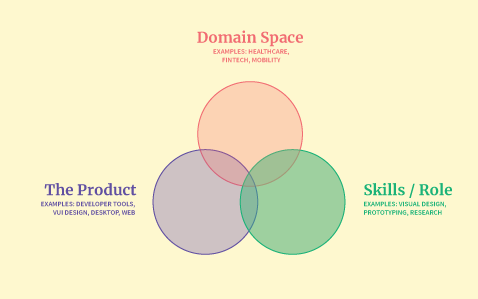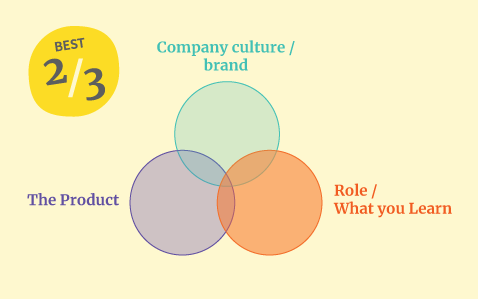As I transition into my next role, I thought it would be helpful to document the whirlpool of decision making that comes into play when choosing a design role in the Bay Area.
1. What kind of company do I work out?
- Large tech company - in many ways working at a large tech company is a "cushy" job. You will get lots of perks, very good pay (probably the highest out of the categories mentioned), and will have a wonderful name brand on our resume. With that said, the experience within a large tech company highly depends on your team. You may or may not be expected to work 12 hour days (since you are getting paid a shit ton), and be on-call quite a bit. With the perk of a work cell phone also comes the shadow of constantly checking Slack (or whatever internal messaging service you may use) as well as the constant drag-motion of checking email on your phone. The roles (for the most part) at large tech companies are hyperspecialized since they have enough money to specialize in roles. Thus, you may be pigeonholed into using only a particular part of your skillset.
- Start-up - working with a small start-up ensures that you're touching each part of the process. Wearing many hats and really exerting the breadth of your skillset comes into play here. However, there are growing pains associated with this. Depending on your team, you may or may not get the support as you get pulled in different directions to finish all the things that are urgent. Becoming proactive from reactive in such an organization is particularly difficult but takes a lot of investment. Equity is definitely a wonderful perk of a start-up but it's important to keep in mind whether they are hoping to get bought out or actually IPO (which makes a difference in their approach to the product design).
- Consultancy / Agency - this is a great way to get breadth on domain space and even skillset in a short amount of time. While I still think some of the most innovative work comes from consultancies and agencies, the pay is on the lower side of things. Combined with the fast pace, these kinds of roles experience a lot of turnover (about 2 years). These roles ensure travel and help you stretch the muscle of talking to clients and facilitation (which I've found are hard to find in other roles).
- Other (non-profits, government services, innovation labs) - mileage may vary. The nature of each of these organizations is different and depends on the context / domain space in which they operate.
I don't touch on mid-size companies although there are quite a few out there. There are also start-ups that function like large tech companies (Ex. Uber, Lyft). While this is a distinctive list, the type of companies themselves live on a spectrum.
2. What skillset am I trying to develop?
- Product Design - you'll find this skillset most prevalent at large tech companies as well as start-ups. At start-ups you'll get to do the entire process (probably super accelerated and super messy), while at large tech companies you'll get to focus on a certain part of the process (prototyping vs last mile shipping product).
- Facilitation - this is extremely important! The skills of storytelling and facilitation to others is key in really making your designs come to life and actually get implemented.
- Pure creativity - I believe that consultancies and agencies do a great job of this because they operate as if they have no constraints.
3. What is your role?
It's important to ask yourself if you're set up for success. In particular, I value independence and autonomy to be able to figure things out solo (having heads down time) and collaboratively design. It's also important to ask here if there's a clear understanding of what you will NOT work on. This sets boundaries and expectations from the start.
4. What is product you're working on? The domain space its within? And it's reputation?
- What domain space are you interested in (healthcare, mobility, fintech, design systems, etc)? (With the proliferation and explosion of design as a field, hyperspecialization has increased quite a bit. Design careers are now being built around domain spaces rather than breadth of applying the design skill (Example: you're a "healthcare" designer rather than a designer that works in healthcare).
- Do you believe in the product?
- Do you want to be part of a company that is known for something? (Ex. Amazon for Alexa's VUI design)
- What is the quality of work like? (Ex. Is a shitty product that needs a lot of improvements or is it pretty refined and you're going to make incremental improvements?)
- What kind of medium are you working in? (desktop vs voice design)
- How is the medium that you're working in setting up subsequent roles?
- Is there a process you want to learn in the development of a product? (Ex. Apple's QA testing is insane and that's something you want to learn about)
I think of this in this diagram with the circle radii being variables correlated with how much importance you give them:
5. Are you a cultural fit?
Culture is a weird thing to try and understand. In a lot ways, until you are immersed in it, you don't quite understand what it is like. Also not everyone has the same experience with the same culture. Thus, here are some questions to get at some kind of cultural understanding within organizations:
- Is design at the core of the product? (There's actually not many LARGE tech companies that can say that minus Apple)
- How mature is the design culture?
- How do you feel supported? What kind of mentorship exists?
- How do you feel challenged daily? How does the culture support risk-taking?
- How is your professional development developed? Measured?
- What still needs to be grown / changed / is missing within the culture as a process? Within the product? [Not only are you designing a product, but the manager should also be designing the team AND individual experiences for each of the team members]
- Are people generally on the same page? (If you ask the same question to different people on the team when interviewing, do they have the same answer?)
5. What else should one consider?
- Compensation - are you getting paid fairly? What are other designers at your level getting paid in the market? (Indeed, Glassdoor)
- Perks - for YOUR LIFESTYLE, what are the perks that actually matter to you?
- Commute - I kid you not, in the Bay Area this is important. If you expect to commute 2 hours a day and produce amazing work, Good Luck. With that said, there are individuals that have commitments and make it work, but why set yourself up that way IF you can help it?
- Time off / Flexible Work Time (WFH Policy) - while many companies do offer unlimited PTO, you should make sure that you are ABLE to take as much time as you need during the year (many companies have a culture where no one actually takes the PTO). Again, this is dependent on your lifestyle but may be something to strongly consider if your commute is difficult.
Concluding Thoughts
A close friend theorized that individuals earlier in their career start at large tech companies and treat them as consultancies. With a high turnover and a fast-paced environment, they get what they need out of those roles. They then go to graduate school to get a boost in their career, which opens more doors to move into higher paying jobs in different echelons.
In a super simplistic way, I've also had a friend tell me you can only choose 2 out of 3 for any one job
Obviously, this is a gross oversimplification of the process but an interesting lens in which to view the decision.
Another way to look at the decision is thinking about the balance between PRODUCT, PROCESS, and PEOPLE.

(Obviously you can do the 5 W's + H with this but I think those are the most relevant)




No Comments.